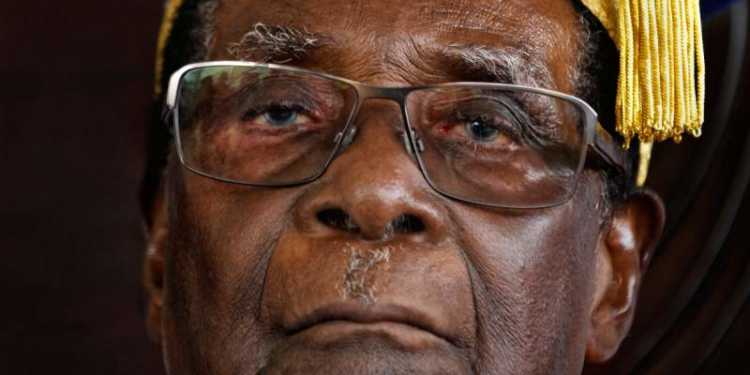There are two kinds of dictators or authoritarians. One kind makes the constitution obsolete and assumes full control or power. Then they unleash fascism and cruelty. Then there is another kind. These leaders pick up glaring loopholes in the constitution and tweak them for their own unlimited benefit. In both the cases, the result is the same. The country and its people have to bear the brunt of the mayhem. The second type of monstrous domination masked under the smokescreen of democracy may be termed as ‘competitive authoritarianism’.
Robert Mugabe’s rule in Zimbabwe belonged to the second type.
Robert Mugabe like most African dictators transformed himself from a freedom fighter to a political prisoner in to a raging oppressor who exploited his own country and people in every way possible. Zimbabwe’s economy was destroyed, elections were rigged, corruption became a norm and political opponents were silenced. Like Most Dictators Robert Mugabe seamlessly fitted in the socialistic mould and populist policies which furthered Zimbabwe’s serious plight.
Robert Mugabe wrecked the nation’s economy. In the early 90s the economy first started showing signs of rapid decline, by 1998 there was a food riot in Harare. It left hundreds dead or injured for life. The riot symbolized Zimbabwe’s impending doom. By the beginning of the millennium, living standards had reached a nadir, life expectancy had reduced, average wages were considerably lower, and unemployment had skyrocketed.
As of 2009, three to four million Zimbabweans who constituted Majority of the nation’s skilled workforce along with the whites left the country. Robert Mugabe simply blamed western powers and the white minority for all the problems in his Country. This convenient rhetoric coupled with his bizarre socialistic policies finally led the central bank of Zimbabwe issuing a hundred trillion bank notes and Cancellation of Zimbabwean Dollar as the official currency in 2009. Hyperinflation soared to unprecedented heights, and the economic choking of Zimbabwe became the darkest chapter of Mugabe’s presidency.
Human rights abuses were rampant in Robert Mugabe’s Zimbabwe. Atrocities were almost institutionalized and according to human rights organisations such as Amnesty International, Restrictions were imposed on right to shelter, food, freedom of movement and other such basic rights. Manhandling of people was a routine affair, Media was under heavy scrutiny, political opponents were ruthlessly dealt with, and activists and human rights personnel were jostled like a bunch of nobodies.
Robert Mugabe consolidated power and decimated the opposition, not democratically but through unfair means. Zimbabwe did not adopt UK parliamentary system after its independence but transformed into a presidential Style of Governance which is easier to manage and even usurp. Mugabe used it to his advantage to become politically immortal while clamping down on his opponents all along. Mugabe went on to centralize all powers tyrannically and created a coterie. His control over his party ZAPU (The Zimbabwe African National Union) was Absolute.
However, Robert Mugabe had his share of fights too. In 2000, Robert Mugabe lost referendum, he came second in first round of elections in 2008 against Morgan Tsavangirai but pro Mugabe militia attacked opponents and manipulated the results. After serving in the national unity govt for four years, he sacked his prime minister and was now hellbent on promoting his wife to his chair. His misstep of trying to install his wife as the puppet president became his waterloo. This irked the army.
One of his biggest blunders was the enforcement of land reforms after 2000. Land reforms in actuality were land invasions where farms owned by white minority were attacked by his his private militia. His militia was his instrument of power that allowed him to rule with an iron fist. These invasions were facilitated by the party officials, the army and police and were later disregarded as unorchestrated public uprisings.
Mugabe justified the atrocities by the stating that the land were being ‘reclaimed’ after being unjustly seized by white settlers from the indigenous African population. He called these invasions, a fight against colonialism. His modus operandi was similar to another African dictator Idi Amin who had done presided over similar raids, the only difference in case of Amin was that his fight was with the Asian Settlers in Uganda. Zimbabwe’s Courts dubbed land invasions as illegal, but Robert Mugabe demonized them and called for the resignation of the judges passing such verdicts. Many white farmers experienced torture, intimidation at the hands of Mugabe’s totalitarian regime and some even died. Most of the seized farms remained empty and the famers to whom they were redistributed failed to upscale the production. This in effect killed agriculture which in turn made 75 percent of the nation’s population dependent on food aid, highest for any country on the planet.
Robert Mugabe tried to add a fresh new chapter in his regime by attempting to put his wife Grace into power. This desperation was necessitated by other factors. The military were ready for a coup, his own party members was nowhere in the mood to reinstate him and most importantly preparations for impeachment proceedings were in full swing. Plus he was old and disorientated. These factors together compelled Mugabe to mull about stepping down.
‘Mugabism’ if it becomes a political jargon someday will be remembered as a heady mix several ideologies. It had anti colonial rhetoric, rabid nationalism, pan African position which was imbibed with reverse racism calling for oppression of the whites. All that with a generous topping of Socialism.
Robert Mugabe could have died of old age while remaining the president of Zimbabwe, but he was denied the ‘glory’. Now, he may suffer the same fate as former Egyptian President Hosni Mubarak.
After the fall of Robert Mugabe, Zimbabwe has once again become an independent nation. Or has it? Because there are reports about China meddling in Zimbabwe’s affair. But that’s for some other time.

























